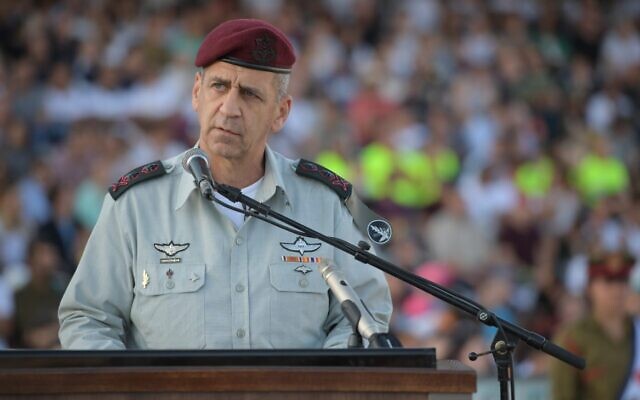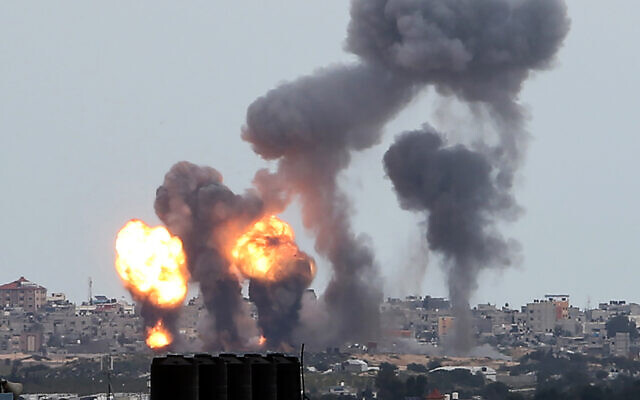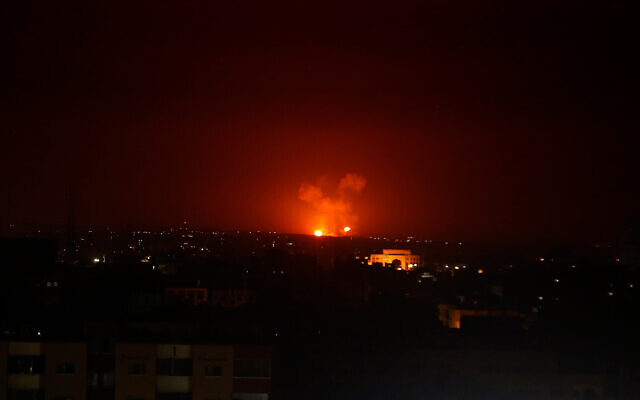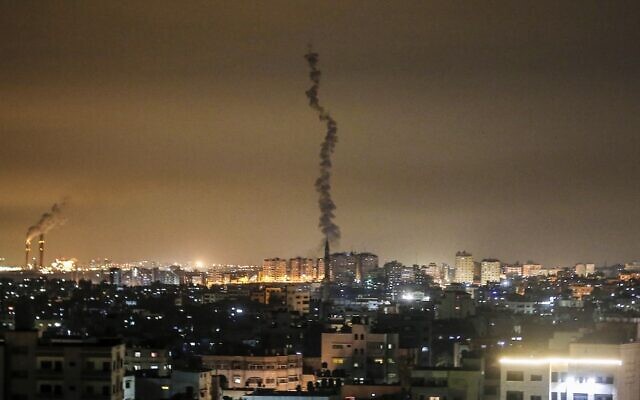Amid reports of ceasefire in Strip, Kohavi says ‘unclear if the incident is at its peak or its end,’ states that situation is fragile

Amid reports of an emerging ceasefire between Israel and the Islamic Jihad terror group in the Gaza Strip, IDF Chief of Staff Aviv Kohavi warned Monday evening that the fighting may not be over yet.
“It’s unclear if the incident is at its peak or its end, if it will escalate, or die down,” Kohavi said at an event for military reservists in the central city of Holon.
His comments came as unconfirmed Palestinian reports said a ceasefire between terror groups in Gaza and Israel would take effect at 10 p.m.
Kohavi said the situation was fragile and could unintentionally escalate into a full-blown conflict.
He stressed: “I don’t think that’s where we’re going… but a not-insignificant number of operations, even wars, in the past 20 years began like that — through escalation that developed into something much bigger.”
He vowed to “do everything to prevent [residents of the south] from feeling insecure and to protect them in every way we can.”
Rocket sirens continued to sound in Israeli communities near Gaza after 9 p.m. Monday, following two days of heavy fighting, as did Israeli airstrikes on Islamic Jihad targets.
In a short statement, the Iranian-backed group said it had completed its “retaliation” for Israel’s killing of three members. But it said it would respond to any further Israeli “aggression.”

Palestinian terror groups said the ceasefire would come into effect at 10 p.m., the Gaza-based Dunya al-Watan news site reports, citing “well-placed sources.”
An Israeli security official confirmed that Israel received “messages from various ranks within the Palestinian Islamic Jihad organization regarding a desire for an immediate ceasefire.”
The official, who spokes anonymously, said Israel was “skeptical” of the requests by the Islamic Jihad. “The IDF will continue to act until quiet is restored to the south,” the official said.
A source in Islamic Jihad also expressed skepticism as to whether the ceasefire would hold, telling Palestine Today, which is linked to the terror group: “The talk about setting specific times for a ceasefire is incorrect. It is dependent on the occupation halting its aggression.”
The group launched dozens of rockets at cities and communities throughout southern Israel on Monday. No physical injuries were reported in those bombardments, though some of the projectiles caused damage to homes and infrastructure. A small number of Israelis sustained minor injuries while running to bomb shelters.
Earlier in the day, the IDF conducted a series of strikes on Palestinian Islamic Jihad sites in the Gaza Strip. The military said this included a rocket launchpad in northern Gaza, which it said was used to fire rockets at Israel earlier in the day, as well as seven observation posts along the border with Israel.
The Hamas-run Gaza health ministry said that no one was injured in the Israeli strikes.

Israel’s military liaison to the Palestinians announced that it would be closing Gaza’s Erez pedestrian crossing, save for “humanitarian cases,” and that it was restricting the Strip’s fishing zone to six nautical miles, from 15. The Kerem Shalom crossing, which brings in the majority of Gaza’s commercial goods, would remain open.
Both Israeli and Palestinian officials threatened to step up their strikes if the other side continued its attacks.
Prime Minister Benjamin Netanyahu appeared to threaten to kill the heads of Gaza’s terror groups if rocket fire from the Strip continued.
“We will continue to strike until the calm returns. If there won’t be quiet, you’ll be next,” Netanyahu said, during a visit to the city of Ashdod.
The round of violence was sparked by an irregular clash along the Gaza border Sunday morning in which Israeli troops shot dead a member of Palestinian Islamic Jihad as he planted an improvised explosive device along the border. The Israeli military then retrieved his body, using a bulldozer.
The retrieval of the corpse was apparently part of Bennett’s announced plan to “hoard” the corpses of Palestinian terrorists in order to use them as “bargaining chips” in negotiations for the release of two Israeli men, and the remains of two fallen Israeli soldiers, who are being held by Hamas in the Gaza Strip.

On Sunday evening, Islamic Jihad and other terror groups fired some 30 rockets at Israel, approximately half of which were intercepted by the Iron Dome missile defense system. The rest landed in open fields. Some shrapnel caused light property damage, but no injuries were reported.
The IDF retaliated with airstrikes on Islamic Jihad facilities in both Syria and Gaza. Two members of the terror group were killed in the airstrikes outside Damascus along with four other pro-Iranian fighters, according to a Britain-based Syrian war monitor.
The border clashes come amid reports of ongoing efforts by Israel to seal a ceasefire agreement with Gaza terror groups, following weeks of intermittent rocket fire and the regular launching of balloon-borne explosive devices into Israel.
As reported by The Times of Israel
